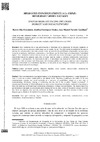Please use this identifier to cite or link to this item:
https://accedacris.ulpgc.es/jspui/handle/10553/71125
| Title: | Migrantes españoles frente a la crisis: movilidad y redes sociales | Other Titles: | Spanish migrants facing the crisis: mobility and socialnetworks | Authors: | Díaz Hernández, Ramón Faustino Domínguez Mujica, Josefina Parreño Castellano, Juan Manuel |
UNESCO Clasification: | 5403 Geografía humana 3304 Tecnología de los ordenadores 630906 Movilidad social |
Keywords: | Movilidad espacial Diásporas digitales Redes sociales Interactividad Comunicación, et al |
Issue Date: | 2020 | Publisher: | Cabildo Insular de Gran Canaria | Conference: | XXIII Coloquio de Historia Canario-Americana | Abstract: | Esta comunicación es una aproximación al fenómeno de la emigración de jóvenes españoles en
tiempos de crisis en un contexto condicionado por el mundo digital. Por ello aborda la realidad de los nuevos
sistemas de comunicación y las redes sociales como un universo de posibilidades relacionadas con una nueva
forma de comunicarse, informarse, relacionarse o movilizarse que ha dado lugar a la denominada “ciudadanía
digital”. Una ciudadanía transnacional en la que los millennials son actores principales que ilustran lo que la
conectividad digital ha supuesto para ellos: el modo ideal de contar y compartir información, experiencias,
sentimientos y percepciones. La hiperconectividad y la inmediatez que marcan las redes sociales permiten
compartir la vida en tiempo real. Conscientes del escenario público en el que se mueven como e-migrantes,
participan activamente en comunidades digitales y su presencia en esas diásporas virtuales crece gracias a la
movilidad auspiciada por la tecnología. This communication is an approximation to the phenomenon of the emigration of young Spaniards in times of crisis in a context conditioned by the digital world. Therefore, it addresses the reality of the new communication systems and social networks as a universe of possibilities related to a new way of communicating, informing, relating or mobilizing that has led to the so-called “digital citizenship”. A transnational citizenship in which millennials are major actors illustrating what digital connectivity has meant to them: the ideal way to tell and share information, experiences, feelings, and perceptions. The hyperconnectivity and immediacy that mark social networks allow sharing life in real time. Aware of the public scenario in which they move as migrants, they actively participate in digital communities and their presence in these virtual diasporas grows thanks to the mobility fostered by technology. |
URI: | https://accedacris.ulpgc.es/handle/10553/71125 | ISSN: | 2386-6837 | Source: | XXIII Coloquio de historia canario americana [ISSN 2386-6837], p. 476-488, 2018 |
| Appears in Collections: | Actas de congresos |
Page view(s)
253
checked on Nov 1, 2024
Download(s)
118
checked on Nov 1, 2024
Google ScholarTM
Check
Share
Export metadata
Items in accedaCRIS are protected by copyright, with all rights reserved, unless otherwise indicated.
